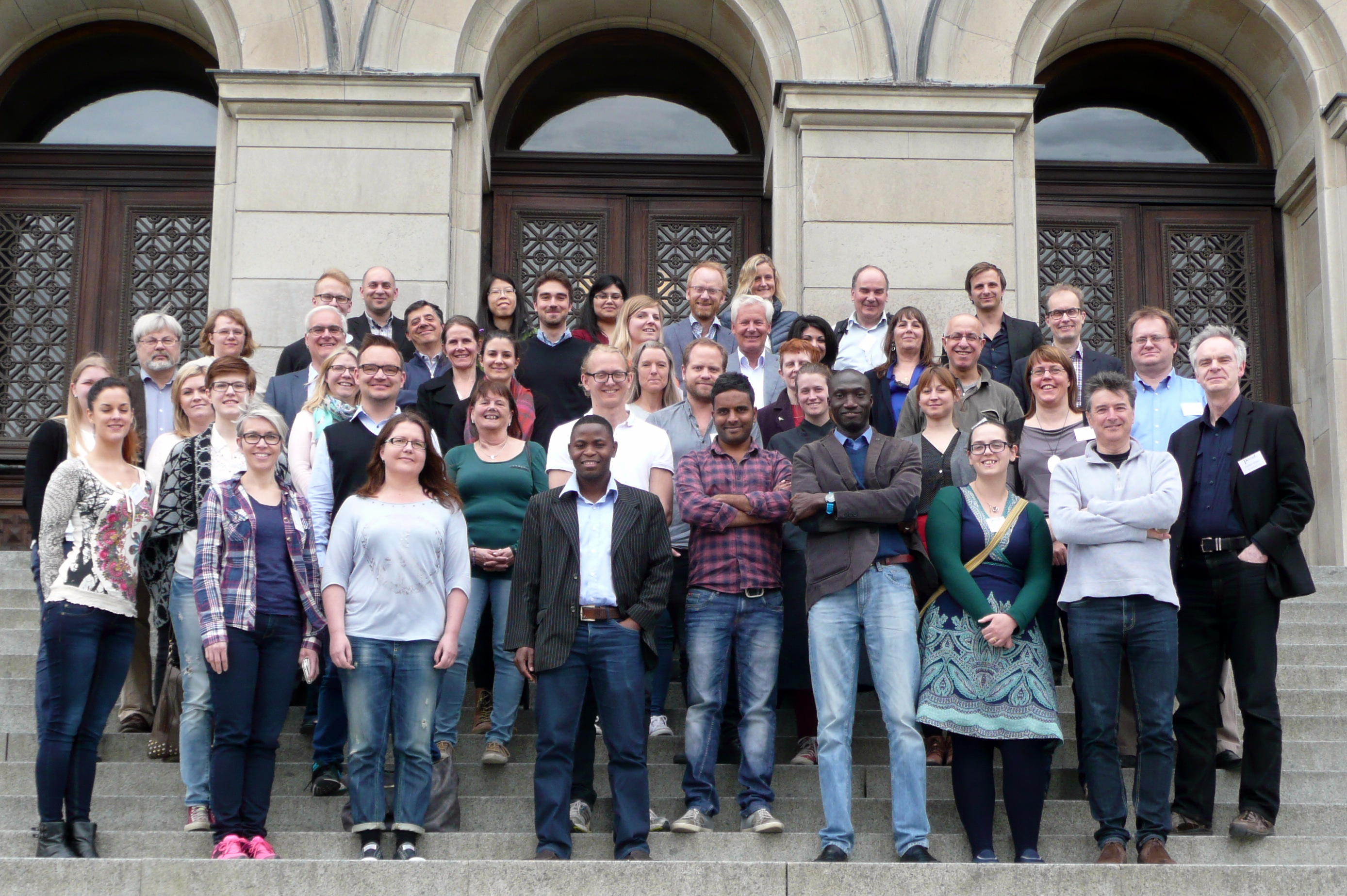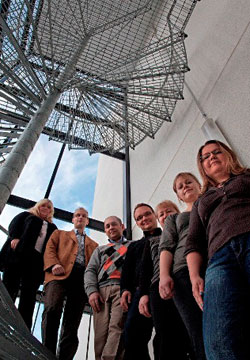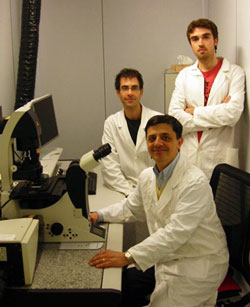PEVNET consists of 13 project partners from 6 countries around Europe with University of Tampere, Finland as the coordinating partner. The success of the ambitious project will be assured by very experienced consortium. The partners of PEVNET have conducted several large-scale studies before. In addition, many participants have had mutual collaboration before.

 Tampere University
Tampere University
Heikki Hyöty
Faculty of Medicine and Health Technology / Virology
Tampere University
Arvo Ylpön katu 34
FI-33520 Tampere
Finland
+358 50 516 8480
heikki.hyoty (at) tuni.fi
Expertise
Professor Hyöty’s group has long experience in studies evaluating the role of viruses in type 1 diabetes and allergies. He has published pioneering prospective studies and has made many new discoveries on the role of enteroviruses in diabetes. One recent initiative is a project aiming at developing enterovirus vaccine against type 1 diabetes. This long-term commitment to this particular topic has created a strong research center in Tampere. Dr. Hyöty has previous experience from the coordination of large scale international research projects (for example two EU projects) and the laboratory participates in international quality control programmes (e.g Quality Control for Molecular Diagnostics, QCMD) and complies with general GLP and written SOPs. Professor Hyöty’s group has also made pioneering work in translation of research findings in collaboration with academic and industrial partners.
Role
Professor Hyöty is coordinating scientist of the consortium having a leading role in several scientific tasks. Moreover University of Tampere is the leader partner of the WP1 Management, WP11 Data management and quality assurance, WP12 Dissemination
Principal investigator: Professor Heikki Hyöty
Key investigators: Amirbabak Sioofy-Khojine, Post-doctoral researher; Sami Oikarinen, PhD student; Hanna Honkanen, PhD student; Maarit Oikarinen, PhD student, Jutta Laiho, PhD student; Noora Nurminen, laboratory manager
Uppsala Universitet
Professor Olle Korsgren
Department of Immunology, Genetics and Pathology
Uppsala University Hospital
Uppsala, Sweden
e-mail: Olle.Korsgren@igp.uu.se
Ass Prof Gun Frisk
Department of Immunology, Genetics and Pathology
Uppsala University
Uppsala, Sweden
e-mail: Gun.Frisk@igp.uu.se
Expertise
Associate Professor Frisk group expertise is virus role in the ethiology of Type 1 Diabetes. The group has build a virus bio bank containing many well-characterised virus strains that can be used in vitro studies. Trough collaboration with Prof. Olle Korsgren, Uppsala University, the group has access to whole pancreas, isolated human pancreatic islets and exocrine cell clusters from normal organ donor and from, type 1 diabetes donors and from organ donors with diabetes related autoantibodies.
Role
Partner is the leader of the WP8; Enterovirus induced changes of in islet of Langerhans
Group’s role is to:
Study the interaction of different strains of enterovirus with isolated human islets of Langerhans
Study the effect of infection on genes involved in innate immunity
Study to what extent infected islets secret chemokines/cytokines
Study replication complexes within the insulin producing cells with the use of electron microscopy
Study the tropism of the different virus strains in human pancreatic cells
Principal investigators: Associate Professor Gun Frisk, Professor Olle Korsgren
Key investigators: PhD Therese Rosenling, Monika Hodik and Mahesh Anadandula
 University of Siena
University of Siena
Professor Francesco Dotta
U.O. Diabetologia, University of Siena
Siena, Italy
e-mail: francesco.dotta (at) alice.it
Expertise
SienaProfessor Dotta’s group’s expertise is the characterization of diabetes-associated islet autoimmune response and of islet pathology in human pancreas and the identification of pathways involved in islet cell damage and regeneration represents the major research focus in Dotta’s laboratory. Through a tight and long-lasting collaboration with Prof. Piero Marchetti from University of Pisa, this group has access, on a regular basis, to whole pancreas and freshly isolated human pancreatic islets from normal, type 1 and type 2 diabetic multi-organ donors, thus collecting extremely valuable material for histochemical, cell culture and gene expression studies in man.
Role
Partner is the leader of the WP6, Inflammation
Group’s role is to:
Identify nature of inflammatory infiltrate and chemokines and chemokine receptors involved in immune cell recruitment to EV infected islets of Langerhans
Study the secretory products released by infiltrating immune cells
Monitor the expression of inflammatory markers in the islets of patients with T1D
Characterize the gene-expression profiles and activated immunological networks in EV infected pancreas and related lymphoid tissues
Analyze the autoimmune response induced by EV infection in the pancreas tissue
Participate into creation of the new euroPOD biobank
Principal Investigator: Prof. Francesco Dotta, M.D.
Key investigators: Dr. Fabio Grieco, B.S.; Dr. Letizia Galleri, Ph.D.; Dr. Guido Sebastiani, B.S.; Dr. Isabella Spagnuolo, B.S.
University of Oslo
Professor Knut Dahl-Jorgensen
Dept of Pediatrics Ullevål
Oslo University Hospital
Oslo, Norway
e-mail: knut.dahl-jorgensen (at) medisin.uio.no
Expertise
The DiViD-project collects biological material from patients with newly-diagnosed T1D in the age 18-40 years. The material includes pancreatic tissue, intestinal tissue, blood, urine, stool and throat-swab. If possible lymph-nodes are also collected. The material is biobanked and then investigated by several other members of the PEVNET to highlight the inflammatory process (insulitis) seen in patient with T1D, with a special focus on examining regarding the presence of viruses. The amount of material, especially the pancreatic and intestinal tissue and the lymph nodes, are very limited, and has to be treated with caution.
Role
Partner is the leader of the WP2, Biobanks
DiViD-group is a head of collection of tissue samples from patients.
Principal Investigator: Knut Dahl-Jørgensen, Professor
Key investigator: Lars Krogvold, MD, PhD-student
University of Exeter
Professor Noel Morgan
Peninsula Medical School, University of Exeter (UK)
e-mail: noel.morgan (at) pms.ac.uk
Expertise
The team coordinated from Peninsula Medical School includes Professor Noel Morgan & Dr Sarah Richardson with collaborators Professor Alan Foulis (Glasgow) and Professor Adrian Bone (Brighton). The group has long-standing expertise in the isolation and functional characterization of pancreatic beta-cells. It has well established methods for study of the regulation of cell viability, cell cycle progression, proliferation and insulin secretion. The group also has considerable expertise in the application of immunohistochemistry, confocal and fluorescence microscopy to study of pancreatic immunopathology.
Professor Foulis contributes a critical resource (and expertise) for the present project, comprising a collection of over 70 autopsy pancreases of young people who died of type 1 diabetes shortly after clinical presentation. This represents the largest such collection worldwide. In these pancreases there is often active destruction of insulin secreting beta cells and the processes involved can therefore be studied in detail by examination of pancreatic sections. This resource (together with tissue samples from a wide range of controls) are being utilized to investigate the prevalence and consequences of enteroviral infection in human islets and to study the pattern of anti-viral responses and their relationship to islet autoimmunity in type 1 diabetes.
Role
Partner is the leader of the WP3, Detection of viruses
Group’s role include:
Characterisation of the inflammatory infiltrate and expression of chemokines and their receptors in the inflamed islets of human patients with recent-onset type 1 diabetes
Definition of the anti-viral pathways activated during enteroviral infection of human islet cells.
Identification of the enteroviral serotypes present in human pancreas in type 1 diabetes by the use of serotype-specific antisera and methodologies to identify viral RNA sequences.
Analysis of beta cell proliferation in vivo in type 1 diabetic pancreases, and assessment of the factors which may promote beta cell division using cell biological techniques in vitro
Principal investigator: Prof. Noel Morgan
Key investigators: Dr Sarah Richardson, Prof. Alan Foulis (Glasgow), Prof. Adrian Bone (Brighton)
King’s Collage London
Professor Mark Peakman
Division of Immunology, Inflammation and Infectious Diseases (DIID)
2nd Floor, Borough Wing
Guy’s Hospital, Great Maze Pond
London, UK
SE1 9RT
e-mail: mark.peakman@kcl.ac.uk
Expertise
Measuring T cell immune responses in individuals has been a main focus for our group. A major challenge within the field has been developing sensitive assays with high specificity for assessing rare autoreactive T cell responses. Development of highly sensitive ELISpot assays which allow qualitative assessment of responsive T cells, and tetramer technology permitting parallel examination of CD8 T cells bearing antigen specific TCR, have been major foci of our developmental work in the field of immune cell monitoring.
Another key aspect of our work in type 1 diabetes (T1D) has been the analysis of peptide epitopes presented by MHC class I molecules from β-cell antigens. CD8 T cells provide the cytotoxic end-stage in T1D through their direct contribution to destruction of β-cells. Irrefutable evidence for the importance of epitopes can be ascertained through assessment of peptide-specific CD8 T cell responses to human β-cells and other relevant targets. Thus we have expertise in isolation and characterization of peptide-specific CD8 T cells and in the analysis of their cytotoxic potential using relevant human targets.
Group goals within PEVNET
The association between enterovirus (EV) and T1D is now well founded, but there has been little research on the adaptive cellular arm of the immune response to EV. Our group’s goal within PEVNET will be to identify EV epitopes, and use ELISpot techniques to initially identify immunodominant peptide responses. Identification of immunodominant CD8 T cell peptides will allow us to investigate corresponding cells within T1D patients and controls using tetramers loaded with EV peptide. Techniques will also be implemented to isolate EV-specific CD8 T cells, and observe their interaction with human β-cells.
Investigating responses of patients and controls using these technologies will provide new tools for testing the strength and mechanism of EV association with T1D. CD8 T cell clones specific for these peptides can be used to further analyse whether there is direct cytotoxicity of EV infected or uninfected β-cells. In conjunction, we can examine the within the pancreas of EV-specific CD8 T cells by in situ tetramer staining.
Principal investigator – Prof Mark Peakman MBBS, BSc, MSc, PhD, FRCPath (mark.peakman@kcl.ac.uk)
Key Investigators – Robin Knight BSc (awaiting PhD) (robin.knight@kcl.ac.uk)
http://www.kcl.ac.uk/schools/medicine/research/diiid/depts/immunobiology/groups/peakman/
Office Tel: 020 7188 3069
Laboratory Tel: 020 7188 3076
Karolinska Institutet
Associate Professor Malin Flodström Tullberg
Center for Infectious Medicine (CIM), Department of Medicine
Karolinska Institutet
Stockholm, Sweden
e-mail: malin.flodstrom-tullberg (at) ki.se
Expertise
A major research focus in Flodström-Tullberg’s laboratory is the etiopathogenesis of type 1 diabetes. More specifically, the interactions between infectious agents, the host immune system and the pancreatic beta cells are studied. Other research interests include cystic fibrosis related diabetes.
The group has strong expertise in innate immunity with a special interest in antiviral defense mechanisms. The group also has detailed knowledge on the etiopathogenesis of type 1 diabetes, experimental animal models for type 1 diabetes, as well as the generation of so-called humanized mouse models. Established techniques include in vitro and in vivo infection models, multicolor flow cytometry, immunohistochemistry, confocal microscopy, Real-Time PCR, Westernblot analysis, ELISA, transfection, RNA interference, virus titration (plaque assay and flow cytometry-based methods), islet isolation, islet transplantation, transgenic and knock-out animals.
Role
Partner is the leader of the WP5, Innate immune system
The aims of WP5 are to characterize the innate immune response to enterovirus infections and to determine whether individuals with an increased genetic risk for type 1 diabetes development have an altered response to enteroviruses. A special focus is on the ifih1 gene, which harbors several non-synonymous SNPs associated with altered risk for diabetes development. The Flodström-Tullberg group will mainly work on these aims but also contribute to the work in WP4 (Persistent infection) and WP8 (Virus induced changes in islet cell cultures).
Principal investigator: Associate Professor Malin Flodström Tullberg
Key investigators: M. Sc. Katharina Lind, M. Sc. Emma Svedin
Centre Hospitalier Regional et Universitaire de Lille
Professor Didier Hober
Laboratory of Virology
University Lille 2
Lille, France
e-mail: didier.hober (at) chru-lille.fr
Expertise
Virology: Molecular and cellular mechanisms of enterovirus infection and prevention: application to the pathogenesis of type 1 diabetes. Clinical studies. In vitro and in vivo studies (mouse model).
Role
Partner is the leader of the WP4, Enterovirus persistence. Also contributes to the work in WP7 Virus-specific immune response.
Group’s role and goal is to determine the pattern of antibodies able to enhance enterovirus- induced inflammation and the role of enhancing antibodies in the development of enterovirus persistence.
Principal investigator: Professor Didier Hober
Key investigators: Dr Ilka Engelmann, Dr Anne Goffard, Dr Famara Sane
University of Turku
Professor Jorma Ilonen
Medicity Research Laboratory,
Faculty of Medicine, University of Turku
Turku, Finland
e-mail: jorma.ilonen (at) utu.fi
Professor Riitta Lahesmaa
Turku Centre for Biotechnology
Turku, Finland
e-mail: riitta.lahesmaa (at) btk.fi
Expertise
Research of immunogenetic background of type 1 diabetes has been the major focus in the research of the group of professor Ilonen. The studies have involved screening of genetic susceptibility for major national and international follow-up and treatment studies. These follow-up studies have also made possible to analyse interactions between various genetic risk factors, specific autoimmune responses and environmental factors implicated in the disease pathogenesis.
Professor Lahesmaa and her group have wide experience in functional genomics and e in molecular immunology. Her research group of 22 members uses genome wide and systems biology approaches to study immune response and molecular mechanisms of type 1 diabetes.
Role
Partner is task leader in WP10, Host Genes, and is collaborating with University of Cambridge.
Partner is genotyping established type 1 diabetes susceptibility genes and analysing whether they affect enterovirus association of type 1 diabetes.
Principal investigators: Professor Jorma Ilonen and professor Riitta Lahesmaa
The Chancellor, Masters and Scholars of the University of Cambridge
Dr Sergey Nejentsev
Department of Medicine
University of Cambridge
Cambridge, UK
e-mail: sn262 (at) medschl.cam.ac.uk
Expertise
The group has expertise in genetics of complex disorders, including autoimmune diseases and susceptibility to infection. Dr Nejentsev has a track record in genetic studies of type 1 diabetes in the University of Turku, Finland and then in the University of Cambridge. He has previously discovered several human genes that contribute to type 1 diabetes, including HLA-B and HLA-A genes.
Role
Partner is the leader of the WP9, Host Genes
Principal Investigator: Dr Sergey Nejentsev
University of Helsinki
Professor Mikael Knip
Hospital for Children and Adolescents, Research Center
Helsinki, Finland
e-mail: mikael.knip (at) helsinki.fi
Expertise
Professor Knip’s group has extensive experience in the area of humoral immune responses in type 1 diabetes and other autoimmune diseases. Furthermore, team leader’s publication record in the field of beta-cell autoimmunity and type 1 diabets is impressive. The group has previous experience from large scale international research projects.
Role
The group has important role in screening of study subjects for diabetes-associated autoantibodies and characterisation of the polarisation of the autoantigen-specific humoral immune response in relation to enterovirus-induced beta-cell damage.
Principal investigator: professor Mikael Knip
Key investigators: Taina Härkönen, PhD; Samppa J. Ryhänen, MD, PhD
 Vactech Ltd
Vactech Ltd
Raimo Harju, CEO, M.Sc
Vactech Ltd
Tampere, Finland
e-mail: raimo.harju (at) vactech.fi
Olli Laitinen, CSO, PhD
Vactech Ltd
Tampere, Finland
e-mail: olli.laitinen (at) vactech.fi
Expertise
Vactech Ltd was founded to commercialize the research findings and subsequent IPR originating from academic research. One of the main products in the pipeline is an entero-virus-based vaccine to prevent Type 1 Diabetes. Vactech works in the early phase of the product-oriented development cycle in focused fields of application.
Traditional vaccines contain either killed or attenuated viruses. A more modern approach embraces the concept of Virus Like Particles, VLP. VLP-based vaccines deliver important advantages over traditional vaccines since they provide stronger immunostimulation than denatured virus particles or soluble viral proteins. In addition, they are often effective in eliciting both T- and B-cell immune responses while traditional vaccines induce mainly B-cell responses.
Role
Partner has major role in WP10, Therapies and diagnostics for virus-induced inflammatory diseases, in collaboration with partner 13
Partner’s role is to develop and product the VLPs as therapies and diagnostics for virus-induced inflammatory diseases.
Principal investigator: Olli Laitinen, PhD
Key investigators: Outi Tolonen, PhD; Minna Pulkki, MSc.
Diamyd Medical AB
Anders Essen-Moller, Chairman
Diamyd Medical AB
Stockholm, SWEDEN
+46 8 661 00 26
e-mail: anders.essen-moller (at) diamyd.com
Peter Zerhouni, President and CEO
Diamyd Medical AB
Stockholm, SWEDEN
+46 8 661 00 26
e-mail: peter.zerhouni (at) diamyd.com
Expertice
Role
Principal investicator:
Key investicators:
Karlavägen 108, SE-115 26
Stockholm, SWEDEN
Telephone: +46 8 661 00 26
Fax: +46 8 661 63 68
e-mail: info@diamyd.com
Linköpings Universitet
Professor Johnny Ludvigsson
Div of Pediatrics, Dept of Clinical and Experimental Medicine,
Linköping university
Linköping, Sweden
Email: Johnny.Ludvigsson (at) liu.se
